新概念一册lesson57
新概念英语第一册lesson57 课件

tea in the living room? • 回答:Yes, ____sh_e____ ___d_o_es___. /No,
___s_h_e____ __d_oe_s_n_’t__. • 提问drinks tea: ___W_h_a_t _ ___do_e_s__ Mrs. Sawyer
What time is it?
nine forty-five / a quarter to ten
two seventeen / seventeen past two
three o’clock
nine thirty / half past nine
six fifteen / a quarter past six
quarter ---- 一刻,15分钟,1/4
half ------ 一半,30分钟,1/2
时间的英文表达方法
• 在英语中,时间表达的常用方法有两种。 • 一种是顺读法,先说时针所指的,后说分针所指的数字。如
9:20,英语表达为:nine twenty. 9:50,英语表达为:nine fifty。 • 另一种是倒读法,所谓倒读就是先说分针所指,再说时针所 指的数字。如9:20, 英语表达为:twenty past nine. 9:50,英 语表达为: ten to ten。9:30, 英语表达为:half past nine。 • 我们可以把钟分作两半,半小时前的那半我们用了一个单词 past(过),半小时以后的另一半我们用另一个单词to(差) 来表达时间。 • 除此,在表达15分钟,以及45分钟时,我们用了一个单词 quarter( 一刻)。一样道理,前半小时里用past,后半小 时用to。9:15,英语表达为:a quarter past nine, 9:45则 是a quarter to ten.意思是:差一刻就到10点。
新概念英语第一册Lesson57~62重点内容

新概念英语第一册Lesson57~62重点内容新概念英语第一册Lesson57~58重点内容一、重要句型或语法1、一般现在时与现在进行时1)一般现在时,侧重日常行为或习惯的表达,如:The children go to school by car every day.2)现在进行时,侧重此刻正在发生的行为或动作,如:...but today, they are going to school on foot.2、时刻的问答1)要提问几点钟,一般用:What’s the time now?或What time is it now?2)整点时刻的表达,一般用:基数词+o’clock,其中o’clock经常可以省略。
如:It’s eight o’clock. / It’s eight.二、课文主要语言点The children go to school by car every day. by经常用来表示乘坐的交通工具,如:by ship/sea/plane/air/car/bus;如果要表达走路,要用on foot来表达。
此外,要注意英语中状语的位置,一般以动词为中心,从近到远依次是表程度、方式(by car)、地点和时间(every day)的状语。
but today, they are going to school on foot. 注意句中的are going to school不是be going to do的表将来的用法,而是be doing表现在进行的用法。
on foot表走路,注意表交通工具的by或on后面只能直接接表交通工具的名词单数形式,不能添加任何其他成分。
Mr. Sawyer usually stays at home in the morning. stay at home表示待在家里。
注意home很多时候是用作副词的,如go home或send him home。
Mrs. Sawyer usually drinks tea in the living room. 可以在此复习一下一套房子里的各种房间,如:kitchen, living room, bedroom, bathroom, study等。
新概念第一册词汇语法第57课:An unusual day
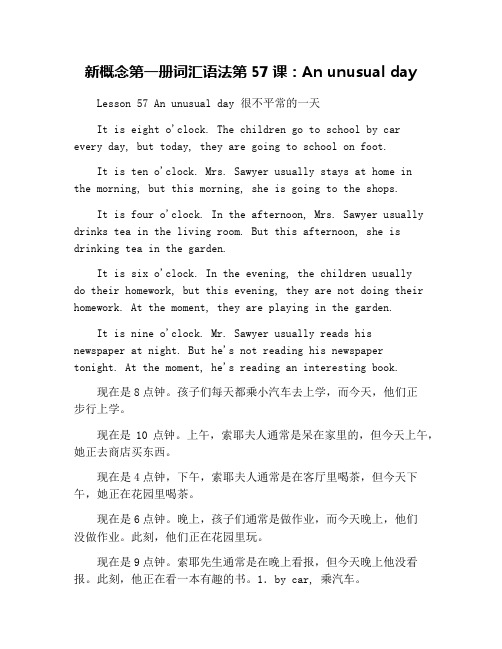
新概念第一册词汇语法第57课:An unusual day Lesson 57 An unusual day 很不平常的一天It is eight o'clock. The children go to school by carevery day, but today, they are going to school on foot.It is ten o'clock. Mrs. Sawyer usually stays at home inthe morning, but this morning, she is going to the shops.It is four o'clock. In the afternoon, Mrs. Sawyer usually drinks tea in the living room. But this afternoon, she is drinking tea in the garden.It is six o'clock. In the evening, the children usuallydo their homework, but this evening, they are not doing their homework. At the moment, they are playing in the garden.It is nine o'clock. Mr. Sawyer usually reads his newspaper at night. But he's not reading his newspaper tonight. At the moment, he's reading an interesting book.现在是8点钟。
孩子们每天都乘小汽车去上学,而今天,他们正步行上学。
裕兴新概念英语第一册笔记:Lesson 57 An unusual day
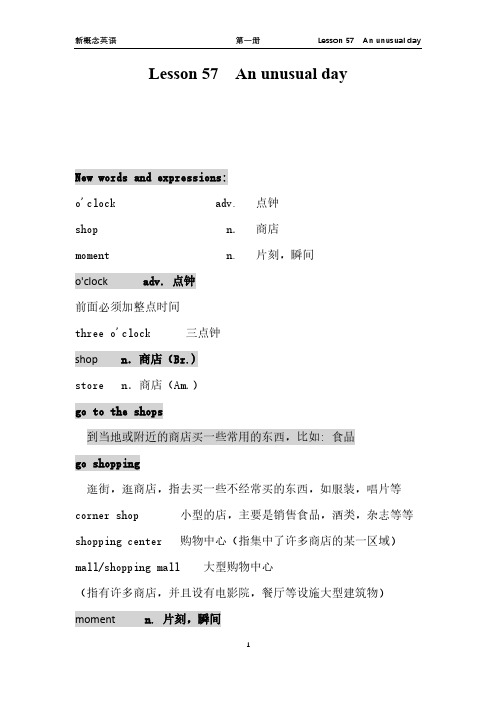
Lesson 57 An unusual dayNew words and expressions:o'clock adv. 点钟shop n. 商店moment n. 片刻,瞬间o'clock adv. 点钟前面必须加整点时间three o'clock 三点钟shop n.商店(Br.)store n.商店(Am.)go to the shops到当地或附近的商店买一些常用的东西,比如: 食品go shopping逛街,逛商店,指去买一些不经常买的东西,如服装,唱片等corner shop 小型的店,主要是销售食品,酒类,杂志等等shopping center 购物中心(指集中了许多商店的某一区域)mall/shopping mall 大型购物中心(指有许多商店,并且设有电影院,餐厅等设施大型建筑物)moment n. 片刻,瞬间a moment 一会儿wait a momentat the moment 目前(一般现在进行时)eg. She is doing her homework at the moment.at any moment 在任何时候; 随时eg. This could happen at any moment.这件事有可能随时会发生。
for the moment 暂时,目前eg. Stop talking about it for the moment.暂不谈论这个问题。
Text:Question:What is Mr. Sawyer doing tonight?It is eight o'clock.现在是8点钟。
1) o'clock前面必须用整点时间。
11 o'clock10 o'clock2) 在英语中常用it来指时间,天气,温度或距离,it被称作“虚主语”。
eg. It is cold. (it指天气)The children go to school by car every day, but today, they are going to school on foot.孩子们每天都乘小汽车去上学,而今天,他们正步行去上学。
新概念英语第一册57课和58课ppt课件

.
Hale Waihona Puke 17注:时刻表上的时间大多采用24小时表示法,这样就不需 要用a.m.表示上午,p.m.表示下午了。
.
13
12 11
10
1 2
9
3
8
4
7
5
6
What's the time?/ What time is it?
.
14
2. It is ten o'clock. Mrs. Sawyer usually stays at home in the morning, but this morning, she is going to the shops.
Lesson 57 An unusual day
.
1
Review
1. seasons spring、summer、autumn/fall、winter 2. months January、February、March、April、May、June、
July、August、September、October 、November、 December
8:00 childre go to school by car going to school
n
on foot
10:00 Mrs. stays at home Sawyer
going to the shops
4:00 Mrs. drinks tea in the drinking tea in
Sawyer living room
现在是8点钟。 孩子们每天都乘小汽车去上学,而今天,他们正步行去上学。
新概念英语第1册Lesson57~62课文翻译及学习笔记
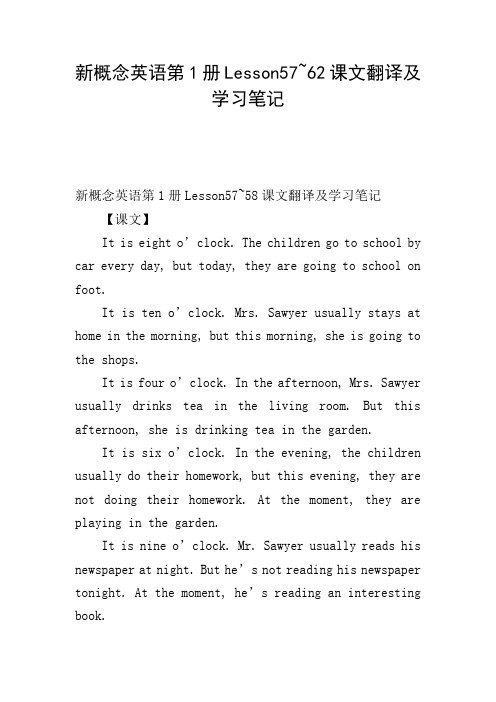
新概念英语第1册Lesson57~62课文翻译及学习笔记新概念英语第1册Lesson57~58课文翻译及学习笔记【课文】It is eight o’clock. The children go to school by car every day, but today, they are going to school on foot.It is ten o’clock. Mrs. Sawyer usually stays at home in the morning, but this morning, she is going to the shops.It is four o’clock. In the afternoon, Mrs. Sawyer usually drinks tea in the living room. But this afternoon, she is drinking tea in the garden.It is six o’clock. In the evening, the children usually do their homework, but this evening, they are not doing their homework. At the moment, they are playing in the garden.It is nine o’clock. Mr. Sawyer usually reads his newspaper at night. But he’s not reading his newspaper tonight. At the moment, he’s reading an interesting book.【课文翻译】现在是8点钟。
孩子们每天都乘小汽车去上学,而今天,他们正步行上学。
现在是10点钟。
上午,索耶夫人通常是呆在家里的,但今天上午,她正去商店买东西。
新概念英语第一册Lesson57-58笔记(语法点+配套练习+答案)
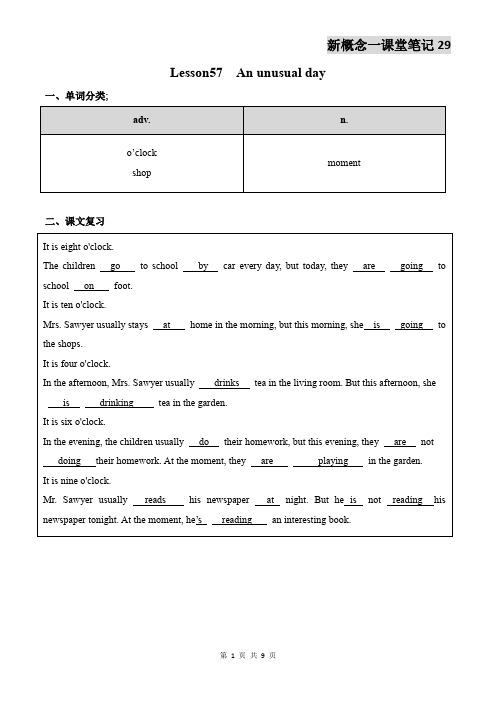
6.The boy reads books every day. (一现)
分钟数大于30分时,用to
1:35twenty-five to two
1:40twenty to two
1:45a quarter to two
1:50ten to two
1:55five to two
对时间提问用:what time
询问时间的特殊疑问句:
1.What time is it?2.What’s the time?
Lesson57 An unusual day
1、单词分类;
adv.
n.
o’clock
shop
moment
二、课文复习
三、课文重点
重点
例句
unusual adj.不寻常的
反义词:usual
构词法:
un- , =not
happy ---unhappy
lucky ---unlucky
adj. + ly =adv.
结构:主+be+动词ing
时间标志词:Look! Listen! now, at the moment, at present, this morning/week
My fatherreads a newspaperevery day.
否:My father doesn’t read a newspaper every day.
回家
stay in bed
呆在床上
by car
坐车
stay with sb.
新概念英语第一册L57~58

Lesson 57 ~ 58 An unusual day!词汇详解(1) o’clock adv. 点钟e.g. 我每天早上7 点起床。
I get up at 7 o’clock every morning.(2) shop n. 商店去商店go to the shop(3) moment n. 片刻,瞬间at the moment 此刻e.g. 此时此刻,我正在听音乐。
I am listening to music at the moment.注意:用at the moment 时,句子常用现在进行时。
!重点语法(1) 钟点的表达法1) 整点时间:在钟点数后直接加o’ clock 即可,也可省略。
2) 非整点时间:①顺读即:先读钟点数,再读分钟数,数字直接读出如:8:30 eight thirty 10:45 ten forty-five② 逆读即:先读分钟数,再读钟点数"情况一:当分钟数小于30 时,用“分钟数+past+钟点数”,表示“…点过…分”;分钟数刚好是半小时时,可用“half past+钟点数”。
如:5:30 half past five 8:10 ten past eight"情况二:当分钟数大于30时,用“分钟数(60减去已知分钟数)+to+钟点数(已知钟点数+1)”,表示“差…分到…点”。
如:9:55 five to ten 4:40 twenty to four#试一试:8:30 half past eight 9:50 ten to ten 2:15 a quarter past two(2) 介词词组表达交通工具"课文原句重现:The children go to school by car every day, but today, they are going to school on foot."结构:by+交通工具,表示乘坐某种交通工具。
新概念英语第一册Lesson57

Listen and answer this question!
1.What is Mr. Sawyer doing tonight? He is reading an interesting book tonight. Listen and answer more questions!
Reading Comprehension I
New Word and expressions 生词和短语
o'clock adv. 点钟 shop n. 商店 moment n. 片刻,瞬间
o'clock /E'klXk/
... 点钟
eight o' clock晚八点。 2.It's eleven o'clock now. 现在是十一点钟。
否定句:主语(I/We/You/They) +do+ not+动词原形+其他 e.g. I don’t stay at home on Saturdays. 主语(He/She/It)+does +not+动词原形+其他 e.g. He doesn’t stay at home on Saturdays.
现在进行时
…..they are going to school on foot. .….she is going to the shops.
…..she is drinking tea in the garden. …..they are playing in the garden. …..he's reading an interesting book.
It is six o’clock. In the evening, the children do their homework usually ______________, but this evening, they not are ____ doing their homework. At the _______, they are _______ in the garden. moment playing
(完整版)新概念第一册第57课

1、一般情况下,直接加S。 2、以 ch ,sh , s, x、o结尾加es。 3、以 辅音字母+y结尾,变y为i加es
以 元音字母+y结尾,直接加s。 4、have-has
一般现在时PK现在进行时
表示 习惯性或经常性发生的动作或状态。
表示说话时正在发生的动作。
He usually eats lunch with his mother's help.
如: It’s __h__a_lf___ ___p_a_s_t___ _s_e_v_e__n__. (现在是七点半) It’s _a__q_u_a__r_te_r___p_a_s_t___n__in__e_. (现在是九点一刻) It’s _a__q_u__a_r_t_er____t_o_ ____tw__o__. (现在是差一刻两点)
Now he is riding his motorbike.
一般现在时PK现在进行时
The Sawyers :
The children
go to school by car are going to school on foot
do their homework are playing in the garden
Mrs.Sawyer stays at home
drinks tea in the living room
Mr.Sawyer reads his newspaper
is going to the shops
is drinking tea in the garden
is reading an interesting book
• seven o’clock in the morning • half past five in the morning • ten to six • twenty five past three • a quarter to twelve • two past five • ten past nine • five past five • twelve o’clock at noon • a quarter past five in the afternoon • six past eleven
新概念英语第一册lesson 57 An unusual day

It is eight o'clock. The children go to school by car every day, but today, they are going to school on foot.It is ten o'clock. Mrs Sawyer usually stays at home in the morning, but this morning, she is going to the shops.It is four o’clock. In the aft ernoon, Mrs Sawyer usually drinks tea in theliving-room, but this afternoon, she is drinking tea in the garden.It is six o’clock. In the evening, the children usually do their homework, but this evening, they are not doing their homework. At the moment, they are playing in the garden.It is nine o’clock, Mr. Sawyer usually reads his newspaper at night, but he is not reading his newspaper tonight. At the moment, he is reading an interesting book.New Word and expressions 生词与短语o'clockadv. 点钟shopn. 商店momentn. 片刻,瞬间本文参考译文现在是8点钟。
孩子们每天都乘小汽车去上学,而今天,他们正步行上学。
新概念英语第一册57课和58课
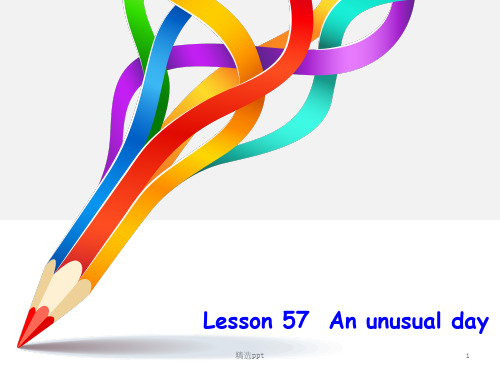
Sawyer living room
the garden
6:00 childre do their homework n
playing in the garden
9:00 Mr.
reads his newspaper reading an
Sawyer
interesting book
精选ppt
9
1. It is eight o'clock. The children go to school by car every day, but today, they are going to school on foot.
☺主语(He/She/It)+动词加s/es+其他 e.g. He stays at home on Saturdays.
否定句:☺主语(I/We/You/They) +do+ not+动词原形+其他 e.g. I don’t stay at home on Saturdays.
☺主语(He/She/It)+does +not+动词原形+其他 e.g. He doesn’t stay at home on Saturdays.
26
1. Look! They are running .
2. Listen! Someone is singing in
the next room.
3. The Greens are watching a football
match now.
现在进行时 表示现在、说话瞬间正在进行或发生
的动作。构成: be动词(am/ is / are) +动词ing形式
新概念第一册Lesson57-58
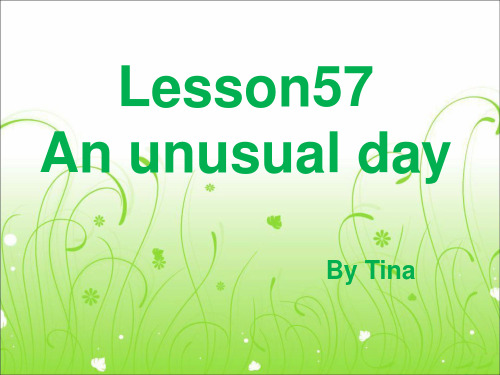
9:45
What time is it?
1. It’s nine forty-five. ( It’s a quarter to ten.) 现在是九点四十五分。
(现在是差一刻十点。)
2:17
2. It’s two seventeen. ( It’s seventeen past two.) 现在是两点十七分。
How to tell the time?(2) 如何表达时间?
• Can you tell me the time? • It's one thirty-five. • It's twenty-five to two.
• Excuse me, have you got the time?
• Yes. It's two forty-five. • Yes. It's a quarter to three.
(现在是六点过一刻。)
6. It’s three fifty. ( It’s ten to four. ) 现在是 三点五十分。
( 现在是差十分四点。)
• shop [ʃɔp] n. 商店
•
v. 逛商店,购物,买东西
• I saw both of them at work in the sh's eleven o'clock now. • 现在是十一点钟。
How to ask the time? 如何问时间?
• What time is it? • What’s the time? • Could you tell me the time? • Excuse me, have you got the time? • What time is it by your watch/ clock?
新概念一册Lesson57-58完整版
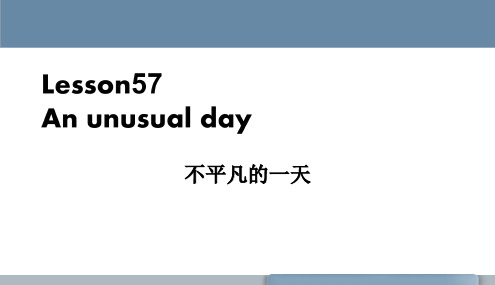
It is six o'clock. In the evening, the children usually do their homework,but this evening, they are not doing their homework.At the moment, they are playing in the garden.Mr. Sawyer usually reads his newspaper at night.But he's not reading his newspaper tonight. At the moment, he's reading an interesting book.
(现在是两点过了十七分。)
3:00
3. It’s three o’clock. 现在是三点。
9:30
4. It’s nine thirty. ( It’s half past nine. ) 现在是九点半。
(现在是九点半。)
6:15 3:50
5. It’s six fifteen. ( It’s a quarter past six. ) 现在是六点十五分。
• 时刻表达法作用大,衣食住行离不开它。 • 整点时把点钟数打,时分俱全不好表达。 • 请记下列几种方法:先时后分莫给弄差。 • 若要说明几点过几分,可把past和after来抓。 • 前分后时不能搞差,要说几点几分差, to前分后时来表达。
- 1、下载文档前请自行甄别文档内容的完整性,平台不提供额外的编辑、内容补充、找答案等附加服务。
- 2、"仅部分预览"的文档,不可在线预览部分如存在完整性等问题,可反馈申请退款(可完整预览的文档不适用该条件!)。
- 3、如文档侵犯您的权益,请联系客服反馈,我们会尽快为您处理(人工客服工作时间:9:00-18:30)。
• • • • • • • • •
(3)n. 玩耍;娱乐: All work and no play makes Jack a dull boy. 只工作而不娱乐会使人变呆的。 2.cook (1)v. 烹调;煮,烧: She cooked a lovely meal for her husband. 她为丈夫做了一顿美餐。 The beef is not cooked enough. 牛肉煮得不够熟。
Lesson 57 An unusual day
• • • • • • • • • •
New words 1.play (1)v. 玩,做游戏: The children are playing in the garden. 孩子们正在花园里玩耍。 (2)v. 参加(体育活动、比赛等): Let's play chess! 咱们来下棋吧! He likes playing basketball. 他喜欢打篮球。
• It is six o'clock. In the evening, the children usually do their homework, but this evening, they are not doing(否定式) their homework. At the moment, they are playing in the garden. • It is nine o'clock. Mr. Sawyer usually reads his newspaper at night. But he's not reading his newspaper tonight. At the moment, he's reading an interesting book.
New words
• 拓展:交通工具 • by car, 乘汽车。 • by(乘坐)表示“乘坐(某种交通工具) ”,但它必须与动词连用。表交通工具的 名词前不加冠词: • by boat 乘船 by bus 乘公共汽车 • by plane 乘飞机 by sea 乘船 • 2.on foot, 步行。
• • • • • • • • • •
3半点:half —— It's half past____(点). 例:八点半/ 十二点半 /七点半 /九点半 4半点之后用 to . It's ____ (分) to ____(点) 例:六点四十。 分析:即七点差二十分 It's twenty to seven. 不能用past. 例:七点五十/五点三十五/一点四十八 5 表示一刻钟(15) a quarter(带读发音) 请翻译:A quarter past one. It's a quarter to four. It's a quarter past nine.
• In the evening, the children come home from school. They___home early. • Mr. Sawyer comes home from work. He arrives home late. At night, the children ___ do their homework. Then they go to bed. Mr. Sawyer ___ reads his newspaper, but sometimes he and his wife watch television.
• 一般现在时表示永久的情况;进行时表示 暂时的情况。 • 进行时只用于表示动作或偶尔发生的事件 (We are eating, it is raining等等)。有些动 词(如 like, want, know等)不是动作动词, 因此不能用进行时态,如不能说 I am knowing或We are liking,而只能说 I know或 We like。
It is eight o'clock. The children go to school by car every day, but today, they are going to school on foot. (They are walking to school today.) • It is ten o'clock. Mrs. Sawyer usually stays at home in the morning, but this morning, she is going to the shops. • It is four o'clock. In the afternoon, Mrs. Sawyer usually drinks tea in the living room. But this after, she is drinking tea in the garden.
Lesson 56 What do they usually do?
Dictation
• • • • • • • • • • 呆在;停留 通常; 家务; 到达 一起 住;生活 午饭 下午 晚上 夜间
words
标好序号
• The Sawyer ____ __ 87 King Street. • In the morning, Mr. Sawyer goes to work and the children go to school. • Their father _____ them to school every day. • Mrs. Sawyer ____ ___ home every day. She does the housework. • She always eats her lunch __ noon. • In the afternoon, she usually__ her friends. They often drink tea together/in the garden.
• TRANSLATE THE TEXT • 复述课文
• Lesson 58
Homework
1, 单词抄写lesson57,每个英文3遍,中文一 遍,要求下周六能够听写. 2,完成练习册lesson5758. 3,听磁带模仿语音语调,并背诵课文.
• 2. 习惯进行:表示长期的或重复性的动作 ,说话时动作未必正在进行。 • Mr. Green is writing another novel. • (说话时并未在写,只处于写作的状态。) • She is learning piano under Mr. Smith.
Grammar 现在进行时
Grammar 现在进行时
• 先做P116 A • 现在进行时结构:(表示正在做或正在发生 的事) • 主语+am/is/are+doing • 现在进行时的基本用法: • 1. 表示现在( 指说话人说话时) 正在发生的 事情。 • We are waiting for you.
Grammar 现在进行时
New words • • • • • • • • 拓展:时刻 at the moment:现在,此刻 for a moment:一会儿 at any moment:任何时候 at the last moment:在最后一刻 in a moment:不久 at the very moment:就在非常的那一刻 at that moment:就在那一刻
• 3. 表示渐变的动词有:get, grow, become, turn, run, go, begin等。 • The leaves are turning red. • It's getting warmer and warmer. • 4. 与always, constantly, forever 等词连用, 表示反复发生的动作或持续存在的状态, 往往带有说话人的主观色彩。 • You are always changing your mind.
TEXT
• Qustions:
• 1 What does Mrs. Sawyer usually do at ten o'clock? • 2 What are the children doing this evening? • 3 what is Mr Sawyer doing tonight?
Grammar 现在进行时
• P116 B • workbook P99 A
与一般现在时比较
• 现在进行时结构:(表示正在做或正在发生 的事) • 主语+am/is/are+doing • 一般现在时结构:(表示经常发生的事) • 主语+do/does(当主语为第三人称单数加s) • 一般现在时表示一般的动作或不断重复发 生的动作;现在进行时表示说话时正在发 生的动作,动作还没有完成
• • • • •
(2)n. 厨子,炊事员: Tom works as a cook in a local restaurant. 汤姆在当地的一家餐馆当厨子。 My dad is really a good cook. 我爸爸烹调手艺特棒。
Hale Waihona Puke New words • 拓展:时间的表达 time • what time is it?/ What's the time? • 1.整点:现在八点/九点/十点/十二点/六点/ 四点了。整点用O'clock • 2 past 过 (半点之前) • 例:几点过几分。It's ___(分) past ____(点). • 六点过十分 /七点过二十分/ 十二点过五分/ 三点二十九分 • It' s ten past six. 或者直接说 six ten.
• 一般现在时表达某个习惯性动作,通常与 时间频度副词连用,如 usually, always, often, sometimes, never等;现在进行时表示 此时此刻正在进行的动作,一般与 now, at the moment, today, this afternoon, this evening, tonight等连用 • We usually watch television at night. But we are listening to the stereo tonight. • 我们通常晚上看电视。但是今晚我们正在 听立体声节目。
